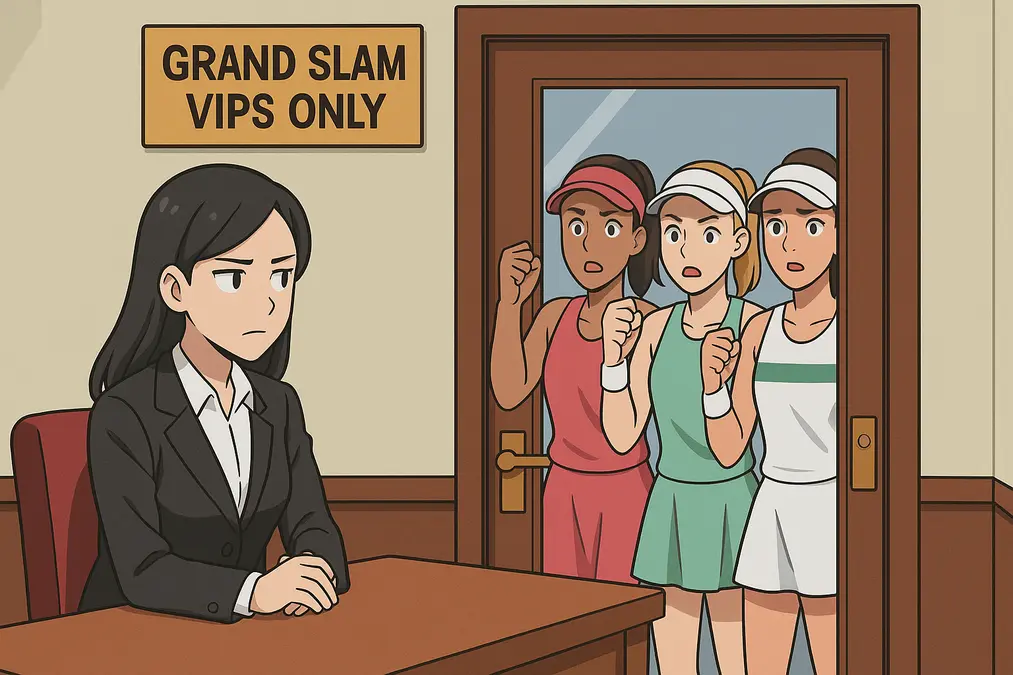For once, the fight isn’t on a baseline — it’s at the boardroom table. The WTA’s biggest names are no longer content to rally from the sidelines as the Grand Slams decide the sport’s future. Aryna Sabalenka, Iga Swiatek, and Jessica Pegula have become unlikely teammates, demanding that tennis’s most powerful tournaments finally listen — and share.
Silence from the Slams
The calls for dialogue began quietly enough — a letter here, a meeting there. But as AFP revealed, talks between player representatives and the Grand Slam boards have drifted into a polite standstill.
Initial meetings in Paris and at Wimbledon brought together a heavyweight cast: Sabalenka, Swiatek, Gauff, Keys, Sinner, Ruud, and Alex de Minaur. Former WTA chief Larry Scott, now acting as an advisor, helped the players formalize their proposals. Yet as the European summer rolled on, the response from the Slams cooled.
Instead, tournament leaders cited “other priorities” — notably the ongoing lawsuit filed by Novak Djokovic’s PTPA, accusing tennis’s governing bodies of “abusive practices” and an “unsustainable calendar.”
“It’s Time to Sit at the Table”
Sabalenka, never one to soften her forehand or her words, put it plainly during the WTA Finals: “I think it’s the time right now to sit at a table and come to a conclusion that everyone will be happy with.”
Her tone was measured, but her meaning wasn’t lost on anyone. The Grand Slams, flush with record revenues, have been reluctant to engage directly with player-led proposals. The players, meanwhile, see this as the moment to push for structural change — not just another pay rise.
Beyond Prize Money
Iga Swiatek, often the voice of calm in an increasingly noisy sport, made clear that this isn’t simply a cash grab.
“It’s not only about prize money,” she said from Riyadh. “It’s about the pension, the health plan, and just having more smooth cooperation and communication in the future. So I think for sure it’s a setback — and for sure the players are not happy with it.”
Her comments captured a wider frustration: that the sport’s financial success hasn’t translated into a sustainable system for its athletes. The Grand Slams, she implied, are happy to celebrate equality on court — less so in governance.
Pegula’s Push for Unity
Jessica Pegula, who sits on the WTA Players’ Council, has been one of the quiet organizers behind the movement. “We’re just trying to be a united voice,” she said. “I think it’s the first time we’ve actually been able to come together with both tours. That’s a testament to everybody being open-minded and wanting to make our sport better.”
But her patience, too, is wearing thin. “The Majors are not responding so far. That’s kind of our problem. I think the ball is a little bit in their court right now.”
The Numbers Game
Money remains the unspoken headline. The PTPA estimates that only 13–15% of Grand Slam revenues currently reach players through prize money. The player proposal — pushing that figure to 22% — still lags behind other major sports, where athletes typically receive around 50% of league revenues.
For the players, the argument is not radical — it’s overdue. The Slams’ global reach and commercial growth have far outpaced the portion distributed to the athletes who actually fill the stadiums and screens.
The New Battle Line
What’s emerging is less a rebellion than a reckoning. The WTA’s leading voices — so often fierce rivals — are speaking in near unison about transparency, equality, and a say in how tennis moves forward.
The Slams, for now, remain unmoved. But the message from the locker room is unmistakable: this generation of players no longer wants to be consulted after decisions are made. They want a voice before they are handed down.
And this time, they’re not asking nicely.
Coco Gauff Leads Top Players in Renewed Push for Fairer Grand Slam Payouts
Why WTA Chief Portia Archer Was Left Frozen Out by Rybakina After Finals Triumph

